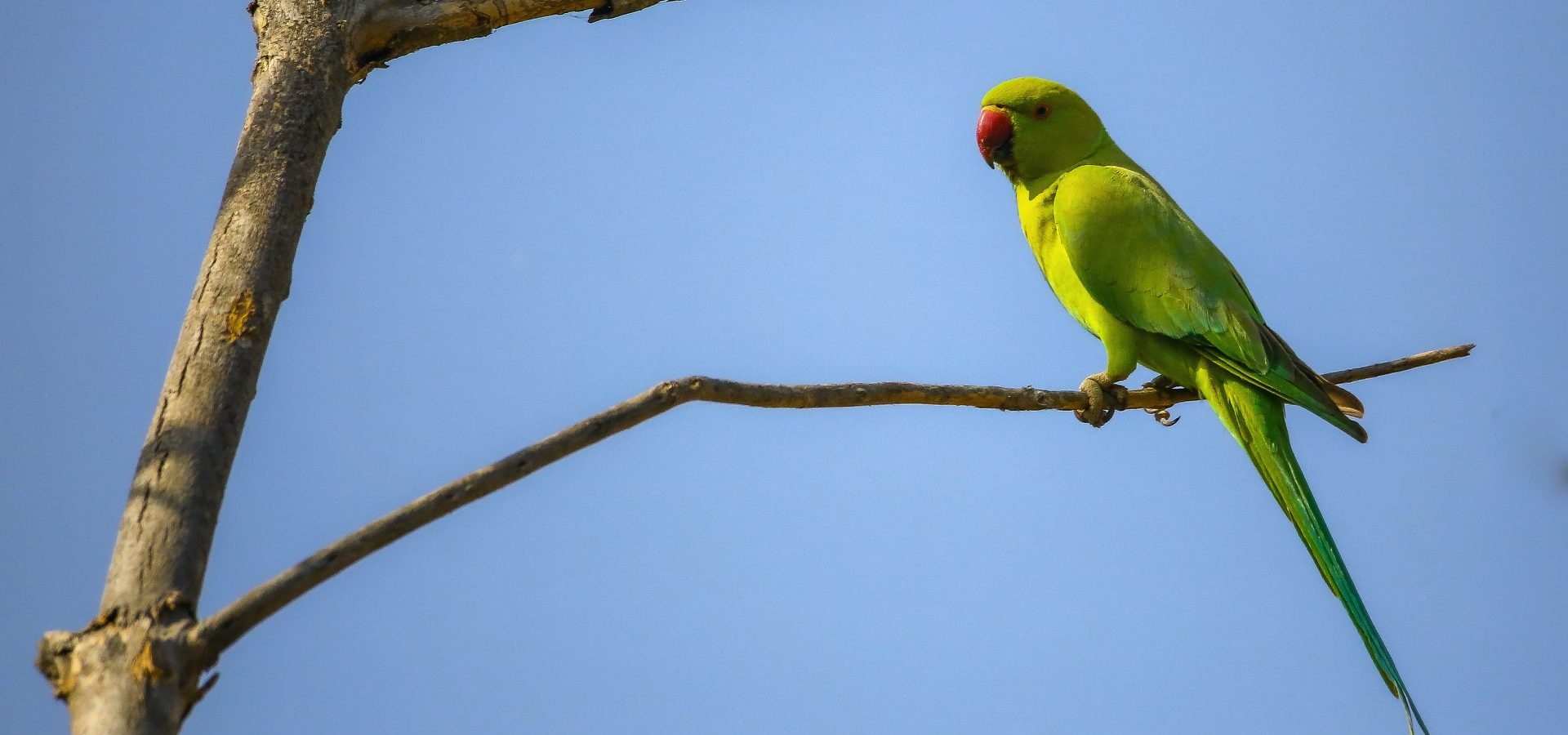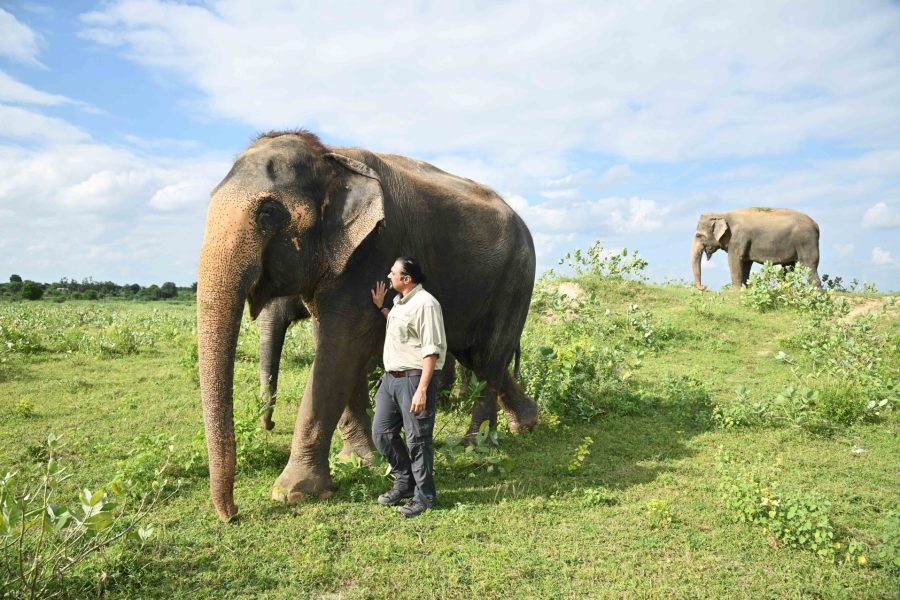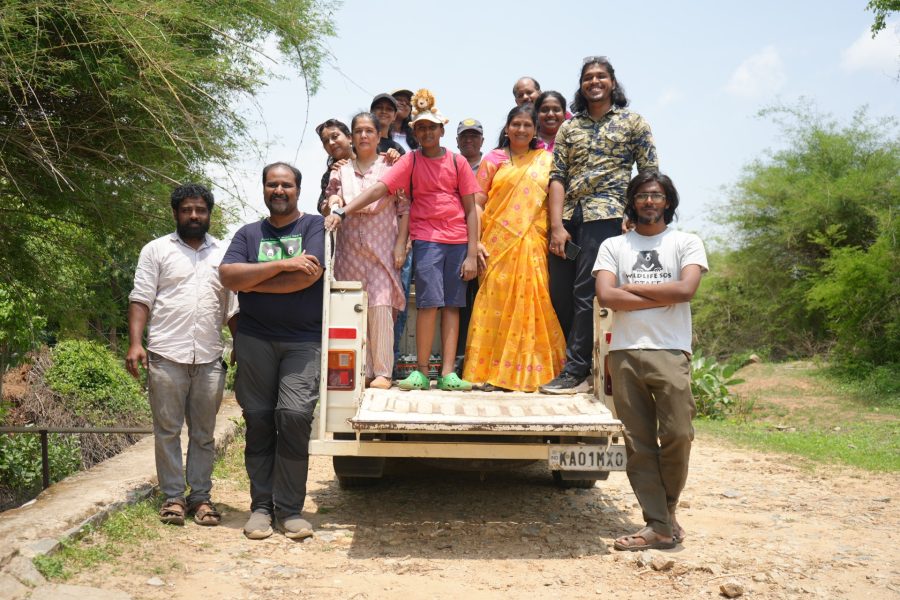Life is beautiful, and a major credit to its beauty can be given to the palette of colours that we see around us. Similarly, the natural world teeming with biodiversity has its fair share of colourful inhabitants. Ranging from butterflies, moths, spiders and even various fishes, the wild hosts an array of vivid colours. But it’s tough to give serious competition to birds when it comes to the spectrum department.
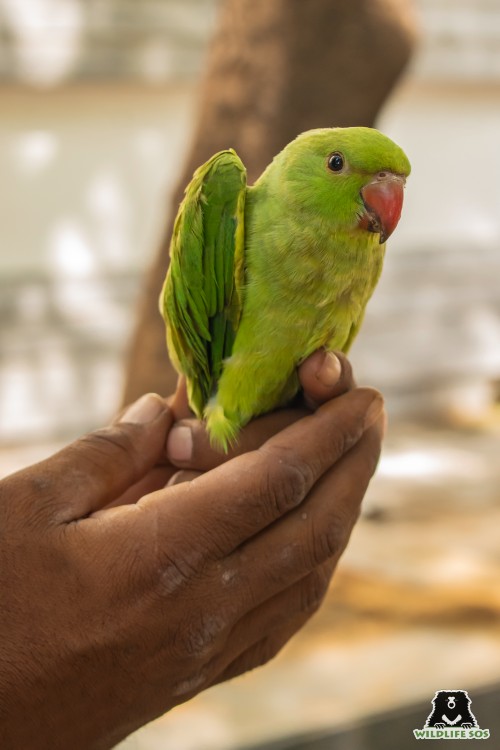
Among the many thousand bird species, one group stands out shining in all its dazzling resplendence: Parakeets. The terms ‘parakeets’ and ‘parrots’ are often used loosely and interchangeably, but that is inaccurate. A proper way to clear the confusion is to understand that parrots are the larger group, consisting of nearly 400 bird species. Lovebirds, cockatoos, macaws, lorikeets, conures and parakeets are all collectively referred to as parrots. Simply put, all parakeets are parrots but all parrots are not parakeets.
Parakeets Flying in India
Eleven native parakeet species flutter around in the skies, forests, cities and towns of India. These include the Rose-ringed parakeet, Plum-headed parakeet, Alexandrine parakeet, Malabar Parakeet, Nicobar Parakeet, Blossom-headed parakeet, Slaty-headed parakeet, Vernal hanging parrot or Indian Lorikeet, Grey-headed parakeet, Red-breasted parakeet and Long-tailed parakeet.
Of the ones mentioned above, Alexandrine parakeets, Rose-ringed parakeets and Plum-headed parakeets are the three most common species entangled in the net of illegal wildlife trade in India. So it is more important than ever to spread awareness about these birds and understand the colourful avians better.
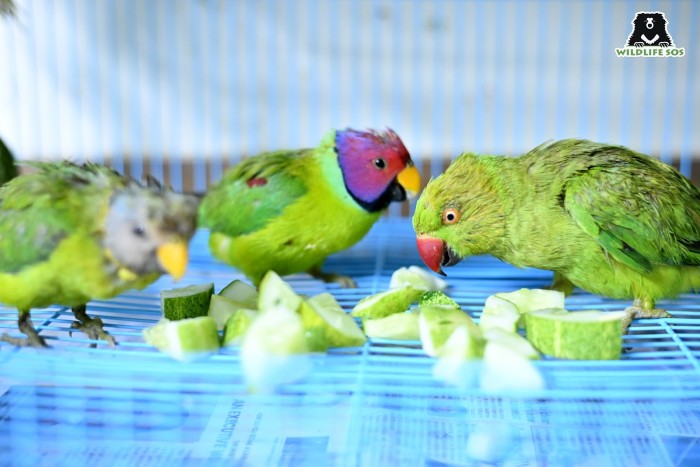
Rose-ringed parakeet (Psittacula krameri) is the most widely distributed of all species, easily identified due to the ring-shaped collar prominent in males. Also called the Ring-necked parakeet, they’re found in various habitats; they inhabit savannas (tropical grasslands), shrubland, rainforests, mangroves and wetlands, gardens and agricultural areas. These birds are mostly diurnal (active during the day) and spend their time foraging, flying around and resting on tree canopies. Rose-ringed parakeets are primarily frugivorous and eat buds, fruits, nuts, berries and seeds. But sometimes they can travel great distances to forage in farmlands and orchards. In fact in India, they feed on cereal grains too.
The Alexandrine parakeet (Psittacula eupatria), just like the Rose-ringed and Plum-headed parakeets, belongs to the family called Psittaculidae. The species inhabits most parts of India, in addition to Myanmar, Thailand, Laos, Cambodia and Vietnam. Compared to the squawking call of its Rose-ringed cousins, their call is a powerful screeching sound. It is one of the largest birds in the Psittaculidae family, measuring up to 60 cm in length and weighing around 200-260 gm. If you ever want to differentiate between the two sexes, the adult males wear black and pink nape bands whereas the females have pale grey and light pink bands.
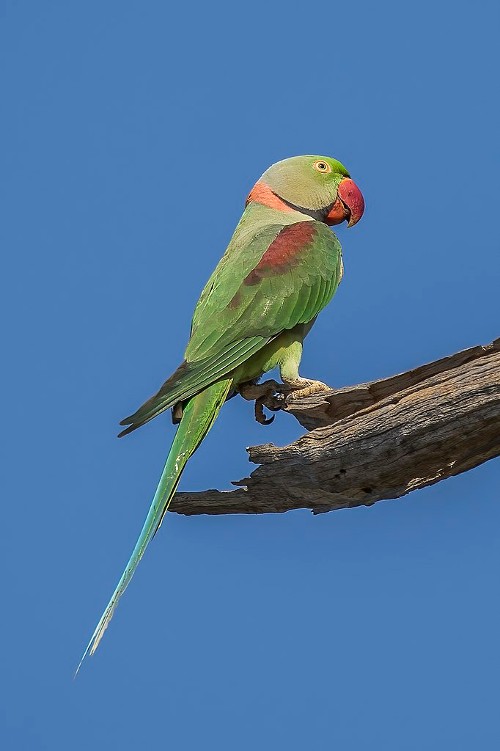
The Plum-headed parakeet (Psittacula cyanocephala) is named so due to the males’ maroon-red head. Females, on the other hand, have a greyish-blue head. The distribution range of this species includes Pakistan, Nepal, Sri Lanka, Bangladesh, Bhutan and India. Plum-headed parakeets can be spotted in various ecosystems ranging from tropical and subtropical forests, parks and agricultural fields. They are present in montane and sub montane forests as well, occurring at elevations of up to 1,300 m.
Caging the Birds
As mentioned earlier, life for these three parakeet species isn’t exactly a bed of roses. Chicks, 3-4 weeks old, are taken away from their natural habitats and confined in cages. Alexandrine, Rose-ringed and Plum-headed parakeets are three of the most traded birds in the country. The trafficking of these animals is flourishing due to their demand as pets.
These birds have an ecological role to play in nature. In the wild, Parakeets are social birds so keeping them in caged, isolated conditions affects their physical and mental well-being. A vast majority of them suffer from disease, suffocation, starvation and dehydration while they are being transported. Their life cycle gets reduced, as many begin to depict stereotypical behaviour of plucking their feathers out. When they’re cooped up in cages, the wings of some of the birds are trimmed to prevent any possibility of escape.
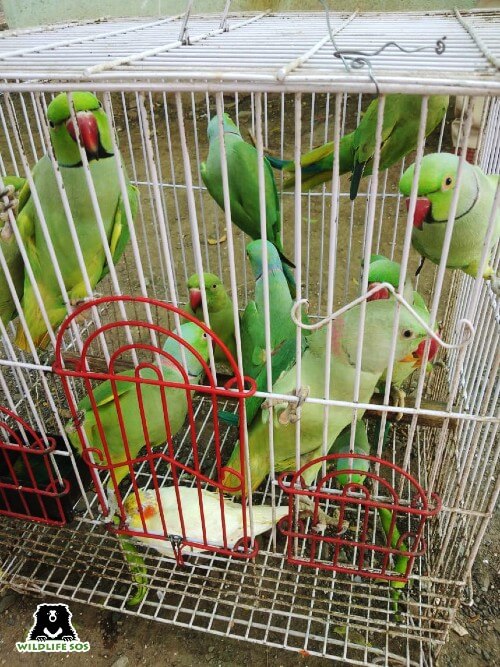
There is also a lot of duping involved in this illicit trade. In acts of barbarism, the shoulders of juvenile Rose-ringed parakeets are coloured and sold as Alexandrine parakeet chicks, since they fetch a higher price. The heads of Rose-ringed parakeets are coloured orange and sold as exotic birds in Bihar and West Bengal, and the heads of Alexandrine parakeets are coloured jet black and sold as rare mutations.
Stitch in Time Saves Parakeets
Wildlife trafficking and trade is the second-largest cause of biodiversity loss after habitat destruction and degradation. Not just in India, parakeets face the brunt of illegal wildlife trade internationally too. To combat this cesspool, Wildlife SOS works to curb poaching and trafficking of parakeets across the country.
In 2021, the Wildlife SOS-GSPCA (Gujarat Society for Prevention of Cruelty to Animals) team assisted the Department of Social Forestry, Vadodara in conducting a series of raids across the city. The combined operation led to the rescue of 101 illegal house pets, which included 32 Alexandrine parakeets, 55 Rose-ringed parakeets and seven Plum-headed parakeets.
Continuing their work with the Gujarat Forest Department, the Wildlife SOS-GSPCA team conducted crucial anti-trafficking efforts in 2022. In the month of August, the team rescued 18 parakeets in a mass seizure operation from Gorwa, Kishanwadi, Ajwa Road and Lalbaug areas of Vadodara. In another raid held across the city in November, the Wildlife SOS-GSPCA team assisted the forest department to seize 15 captive parakeets, which included nine Alexandrine and six Rose-ringed parakeets.
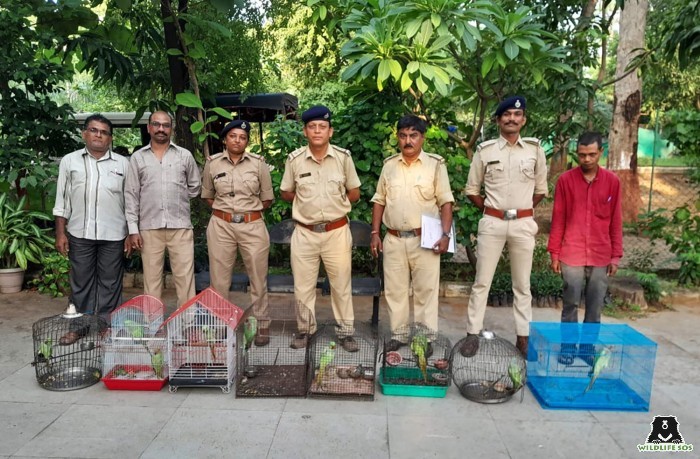
Recently, in March 2023, the Gujarat Forest Department and the Wildlife SOS-GSPCA team seized 14 Rose-ringed parakeets in a collaborative effort from Nagarwada in Vadodara. The birds were rescued from people’s homes in a case of illegal possession of wildlife as pets. These birds have been handed over to the forest department and are undergoing treatment. Once they are deemed fit, the parakeets will be released back into the wild.
Wildlife SOS was involved in one of the biggest raids in recent history against illegal trade of parakeets. In March 2022, over 1700 native birds were found crammed in suffocating cages in Kabutar (Pigeon) Market near Jama Masjid, Delhi. Of the Alexandrine, Rose-ringed and Plum-headed parakeets that were seized, nearly 500 of them were chicks. The rescued birds, including adults, chicks and juveniles, were placed under the care of Wildlife SOS. Our team regularly fed and hydrated the birds, and even made soft beds out of shredded paper to help the chicks feel relaxed. With proper veterinary care, the birds were eventually released back in the wild.
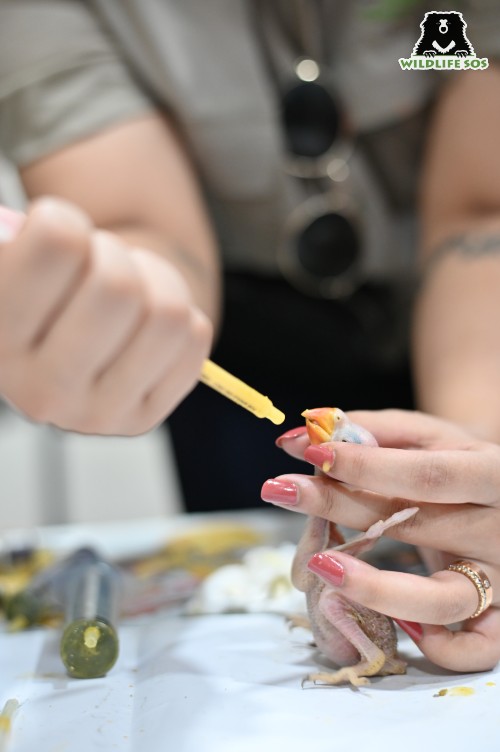
It is a tragedy that most people do not know it is illegal to keep these animals as pets. This is the reality of the unfortunate pet trade that flourishes in urban settings. To educate the public about the illegality of such offences, Wildlife SOS has been working in collaboration with the Gujarat Society for Prevention of Cruelty to Animals and the forest department in Vadodara since 2010 to rescue wildlife trapped in urban localities. We regularly assist the forest department in conducting raids to rescue trafficked animals.
If you ever get to know of situations where wild animals are held in possession illegally, immediately inform the Wildlife SOS 24×7 emergency helplines operating in the following regions:
Delhi NCR – 9871963535; Agra – 9917109666; Vadodara – 9825011117 and Jammu & Kashmir – 7006692300, 9419778280

